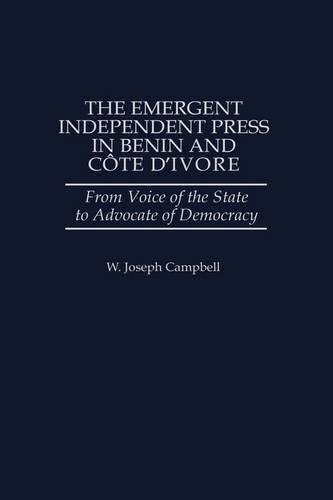
The Emergent Independent Press in Benin and Cte d'Ivoire: From Voice of the State to Advocate of Democracy
(Hardback)
Publishing Details
The Emergent Independent Press in Benin and Cte d'Ivoire: From Voice of the State to Advocate of Democracy
By (Author) W. Joseph Campbell
Bloomsbury Publishing PLC
Praeger Publishers Inc
24th September 1998
United States
Classifications
Tertiary Education
Non Fiction
079.6683
Physical Properties
Hardback
152
Width 156mm, Height 235mm
425g
Description
W. Joseph Campbell, longtime newspaper and wire service journalist, examines the origins and development of the ethos of independent journalism in two former single-party states in francophone West AfricaBenin and Cte d'Ivoire. In both countries since the late 1980s and early 1990s, a diverse and outspoken press, free of direct state control, has emerged and taken hold. Campbell shows how the ethos of independent journalism can emerge from disparate sources and dissimilar historical legacies, despite prolonged periods of repression and autocratic rule. In Benin, the ethos of independent journalism has been shaped by traditions of expressing dissent through the presstraditions established during the long period of French rule. The etiologies of independent journalism in Cte d'Ivoire include policies of the post-colonial regime that sought to channel and constrain dissent and dissident opinion within state structures. Demonstration effects of freely circulated French-language titles also helped shape and give rise to independent journalism in Cte d'Ivoire. The dominant trend in the press in both countries has been toward daily periodicitya trend that suggests a resilience and little-recognized hardiness of journalism in Africa. Campbell draws on extensive interviews with Beninese and Ivorian journalists to challenge the pessimism that defines most studies of Africa's press. This is an important study for scholars and researchers of journalism in the developing world, particularly West Africa, and for students of African political life.
Reviews
"W. Joseph Campbell's book is both a rigorous examination of the emergence of freedom of expression in two African states as well as a model for how developing nations can cope effectively with an independent press. This lively and well-written book is part history, part sociology, and part political economy. Students of Africa, international affairs, and international communication will value its incisiveness and insights."-Everette E. Dennis Distinguished Professor of Communication and Media Management Fordham Graduate School of Business
"Scholars and researchers of African media, media planners and practicioners, students of African politics and sociologists will find this book an indespensable addition to their collection....[T]he book has my full endorsement."-ICB
[F]ascinating both for its analysis of the etiologies and current practices of independent journalism and its commentary on political regimes and regime change....[T]his study is a useful contribution to the literature on Francophone Africa because of the light it sheds on the interplay between journalism and regime change in two specific countries from the colonial period to the present.-French Review
Campbell draws on extensive interviews with Beninese and Ivorian journalists to challenge the pessimism that defines most studies of Africa's press. This is an important study for scholars and researchers of journalism in the developing world, particularly West Africa, and for students of African political life.-New Books in the Communications Library
Campbell's book offers penetrating insights that should provide readers with a deeper understanding of the conflict between inherent political ideologies and journalistic theory and practice in Africa....Scholars and researchers of African media, media planners and practitioners, students of African politics and sociologists will find this book an indispensable addition to their collection. Among the compelling strengths of the book is the originality of its subject matter. The book covers a topic that has not been previously studied.-ICB
Scholars and researchers of African media, media planners and practicioners, students of African politics and sociologists will find this book an indespensable addition to their collection....[T]he book has my full endorsement.-ICB
"Fascinating both for its analysis of the etiologies and current practices of independent journalism and its commentary on political regimes and regime change....This study is a useful contribution to the literature on Francophone Africa because of the light it sheds on the interplay between journalism and regime change in two specific countries from the colonial period to the present."-French Review
"[F]ascinating both for its analysis of the etiologies and current practices of independent journalism and its commentary on political regimes and regime change....[T]his study is a useful contribution to the literature on Francophone Africa because of the light it sheds on the interplay between journalism and regime change in two specific countries from the colonial period to the present."-French Review
"Campbell draws on extensive interviews with Beninese and Ivorian journalists to challenge the pessimism that defines most studies of Africa's press. This is an important study for scholars and researchers of journalism in the developing world, particularly West Africa, and for students of African political life."-New Books in the Communications Library
"Campbell's book offers penetrating insights that should provide readers with a deeper understanding of the conflict between inherent political ideologies and journalistic theory and practice in Africa....Scholars and researchers of African media, media planners and practitioners, students of African politics and sociologists will find this book an indispensable addition to their collection. Among the compelling strengths of the book is the originality of its subject matter. The book covers a topic that has not been previously studied."-ICB
Author Bio
W. JOSEPH CAMPBELL is a former newspaper and wire service journalist who reported from four continentsNorth America, Africa, Asia, and Europein an award-winning 20-year career. He is currently an Assistant Professor at American University's School of Communication.
